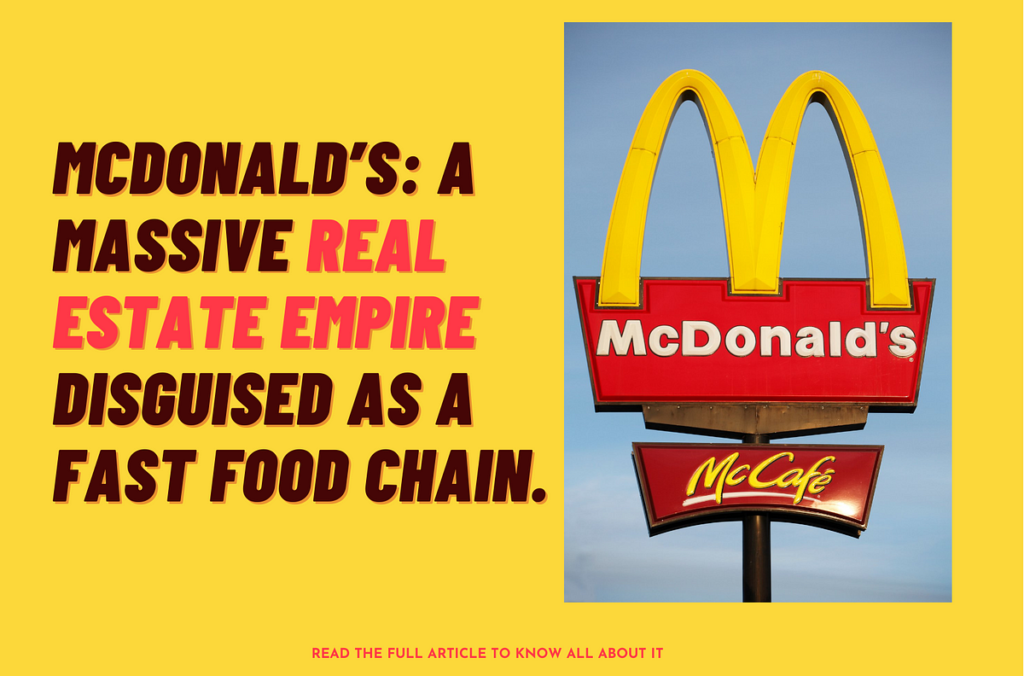Why McDonald’s is Not Just a Fast Food Chain but a Real Estate Giant

When you think of McDonald’s, the first thing that likely comes to mind is its iconic golden arches and the fast-food meals that have become synonymous with quick service dining worldwide. However, beneath the surface, McDonald’s is much more than just a fast-food chain. In fact, McDonald’s can be better described as a real estate giant, with its business model deeply rooted in property ownership and leasing.
The McDonald’s Real Estate Model
The real power behind McDonald’s success lies not in flipping burgers but in its ownership and control of some of the most valuable commercial real estate across the globe. The company’s business model is centered around acquiring and leasing property, which it then rents out to franchisees. This unique approach allows McDonald’s to generate substantial revenue from real estate, in addition to its income from food sales.
Here’s how it works: McDonald’s purchases or leases properties in prime locations, often in high-traffic areas that guarantee a steady stream of customers. The company then leases these properties to its franchisees at a markup. Franchisees pay a combination of rent and royalty fees based on their sales, which means McDonald’s earns revenue not only from the real estate itself but also from the franchisee’s operational success.
The Importance of Location
One of the key reasons McDonald’s has been so successful in the real estate business is its keen eye for selecting prime locations. The company’s real estate team conducts extensive research and analysis to identify locations with high potential for customer traffic. This strategic selection of locations not only drives sales for its franchisees but also ensures the long-term value of McDonald’s real estate assets.
In essence, McDonald’s understands that the success of its franchisees directly impacts the value of its real estate holdings. By ensuring that franchisees are in locations where they can thrive, McDonald’s protects and enhances the value of its properties, creating a virtuous cycle of success.
A Reliable Revenue Stream
McDonald’s real estate strategy provides the company with a reliable and consistent revenue stream. Even during economic downturns, when consumer spending on dining out may decrease, McDonald’s can continue to generate income from its real estate portfolio. Franchisees are obligated to pay rent regardless of their sales performance, providing McDonald’s with a steady flow of income even when its food business faces challenges.
This stable revenue stream is one of the reasons McDonald’s has remained a strong and resilient company over the years. While other businesses may struggle with fluctuating sales, McDonald’s diversified income sources provide a buffer against economic volatility.
Leveraging Real Estate for Expansion
McDonald’s real estate prowess has also played a crucial role in its global expansion. By owning and controlling prime real estate in key markets, McDonald’s has been able to establish a strong international presence. The company’s real estate strategy enables it to enter new markets with confidence, knowing that it can secure high-traffic locations that will drive sales and attract customers.
Moreover, McDonald’s ability to leverage its real estate assets has given it a significant competitive advantage over other fast-food chains. While competitors may rely solely on food sales for revenue, McDonald’s dual focus on food and real estate has allowed it to outperform many of its rivals in both market share and profitability.
The Legacy of Ray Kroc’s Vision
The foundation of McDonald’s real estate strategy can be traced back to Ray Kroc, the man who transformed McDonald’s from a small burger joint into a global empire. Kroc recognized early on that the key to McDonald’s success was not just in selling food but in controlling the real estate where the food was sold. His vision laid the groundwork for McDonald’s to become one of the largest real estate owners in the world.
Kroc’s insight into the value of real estate has had a lasting impact on McDonald’s business model, and it continues to shape the company’s strategy today. By focusing on real estate, McDonald’s has built a business that is not only profitable but also resilient and adaptable to changing market conditions.
Conclusion: The Power of Real Estate
While McDonald’s is often viewed as a fast-food giant, its true strength lies in its mastery of real estate. By owning and leasing prime commercial properties, McDonald’s has created a business model that is both lucrative and sustainable. This unique approach has allowed McDonald’s to thrive in the competitive world of fast food while securing its position as a global real estate powerhouse.
For aspiring business owners and entrepreneurs, McDonald’s success story offers a valuable lesson: sometimes, the real key to success lies not in the product you sell, but in the foundation upon which your business is built
